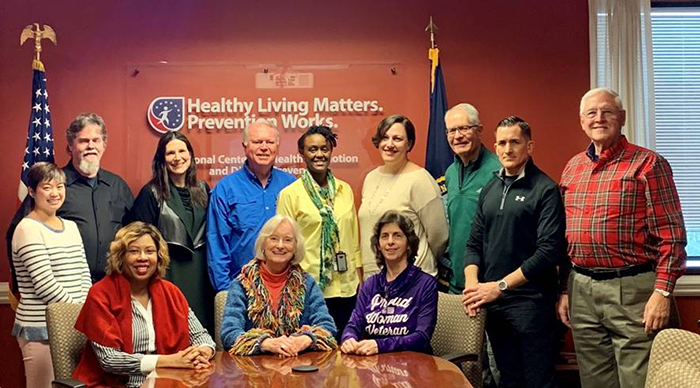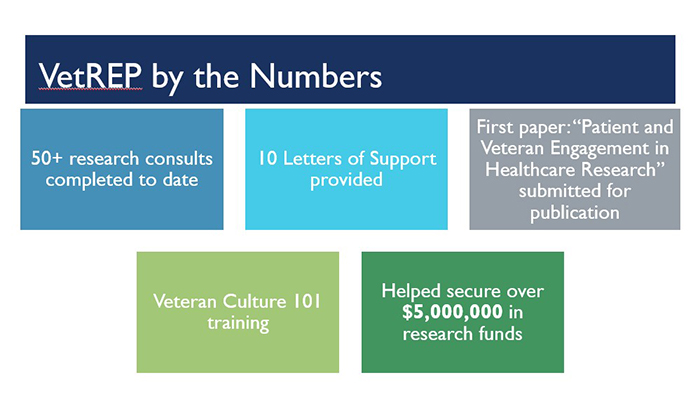 |
Veteran Research Engagement Panel: Seven Years of Co-Designing ResearchVeterans’ Perspectives highlights research conducted by HSR&D and/or QUERI investigators, showcasing the importance of research for Veterans – and the importance of Veterans for research. In the November-December 2023 Issue:
|
Introduction“I’ve gained a sense of pride in knowing I’m having a positive impact on the well-being and care of my fellow Veterans and their families, by contributing my experience in dealing with the problems we’re discussing,” - Vietnam War Veteran and 8-year VetREP member Bradley Moses, who lives with a disability In 2015, HSR&D’s Center of Innovation to Accelerate Discovery and Practice Transformation (ADAPT) at the Durham VA Health Care System established the Veteran Research Engagement Panel (VetREP) to focus the science conducted at the center on the values, preferences, and needs of Veterans and their family caregivers. The group is composed of Veterans and Veteran family caregivers whose lived experience informs the evaluations and guidance they provide. VetREP’s mission is to promote Veteran- and Veteran family caregiver-related research by providing guidance to VA researchers in setting research priorities and developing research questions on outcomes that matter to Veterans, co-designing research, and interpreting and disseminating research findings. Members meet monthly to provide feedback to VA investigators, which is formalized through careful documentation of the group’s discussions in meeting minutes. Investigators are invited back to provide updates at 6 and 12 months to address how they acted on the VetREP guidance. 
“VetREP allows investigators to see the soul of their proposed research in its effect. We panel members give voice for our Veteran community…” “ …it all comes down to helping those who are helping Veterans.”– VetREP members Qualitative Analysis:This Spring, researchers from ADAPT and Duke University’s Sanford School of Public Policy came together to conduct a qualitative analysis of the collaborative work VetREP has done over the seven years since its inception. Primary goals were 1) to better understand the role Veteran engagement groups play in shaping research and 2) to determine how the work being done at the Durham VetREP can be an example of collaborative research partnerships and intentional engagement with Veterans for other VA research facilities to use as a model. The data include initial consultation feedback in the form of meeting minutes from fifty-four research projects where VetREP provided recommendations. The meeting minutes review yielded seven consultation types:
Additionally, the researchers sampled twelve projects for which investigators returned at 6 or 12 months after initial VetREP recommendations for deeper analysis, to get a sense of how these Veteran recommendations are implemented within research studies. Using a combination of codes derived from the topics in their interview guide and data-driven codes that emerged from the information, the analysis researchers developed several subcodes that characterize recommendations VetREP provided across projects. Examples of these subcodes are:
For the subset of twelve consults with follow-up reports, investigators were asked to rank the helpfulness of the feedback provided by VetREP and comment on how the recommendations have been applied in their research thus far. Several investigators commented on how tools, written content, or study designs were modified using specific recommendations provided by VetREP. Investigators emphasized how their consultation with VetREP resulted in important changes to their research and allowed them to include the voices of Veterans and Veteran family caregivers and ensure their work is more relevant to the people with whom they work. As one investigator stated: "Multiple adjustments were made to proposed protocol based on ideas from the VetREP committee. I received a great first submission score [on grant application]." 
Impact and Next StepsThe findings from this qualitative analysis characterize VetREP recommendations over time. Researchers’ response to that feedback will serve as the foundation for several products. As a result of the qualitative analysis, a Veteran-friendly summary of the major findings is being developed that VetREP itself, as well as other VA Veteran engagement groups, will be able to use in future research consultations. The work will also be used as a training tool for onboarding new VetREP members. Next, the findings will be used to assist VA investigators in developing new grant proposals focused on the summary of guidance VetREP has shared with researchers. Analysis researchers are writing a paper for a peer-reviewed journal to disseminate these findings to investigators and community partners beyond VA. As one long-term VetREP family caregiver member stated: “My dream for VetREP is that we will disseminate our model of success to other VA research groups, indeed, to other VA healthcare teams on all levels and disciplines, to integrate intimately the voice of the Veterans into every process and strategic plan in the VA.” To contact VetREP, please email Dr. Jennifer Gierisch at jennifer.gierisch@va.gov, at the Durham Center of Innovation to Accelerate Discovery and Practice Transformation (ADAPT). |